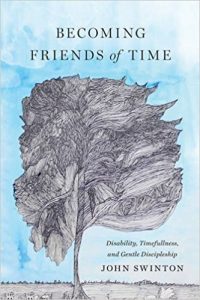 Earthquakes and hurricanes have brought many of us back to the age-old questions about how a loving and powerful God could stand by and not prevent so much human suffering. Especially for people who believe that God is “in control” or who believe in the “providence” of God, how can we explain any devastation?
Earthquakes and hurricanes have brought many of us back to the age-old questions about how a loving and powerful God could stand by and not prevent so much human suffering. Especially for people who believe that God is “in control” or who believe in the “providence” of God, how can we explain any devastation?
Without getting into the many arguments around these questions, I was grateful to read this passage from John Swinton’s book Becoming Friends of Time: Disability, Timefullness, and Gentle Discipleship:
Rather than providence being a “way of describing God’s involvement in every incident that occurs in the world–a perspective that makes God responsible for the most terrible events–Bader-Saye proposes providence is the way we come to ‘name our conviction that our futures can be trusted to God’s care, even when we cannot believe that God is the direct cause of all that happens.’ . . . Providence provides a powerful narrative that ensures that in the midst of the fallenness, brokenness and confusion or God’s creation, God’s story is not lost.”
In the midst of earthquakes, hurricanes, war, and all the more individual suffering people are experiencing right now, God’s story is not lost.


